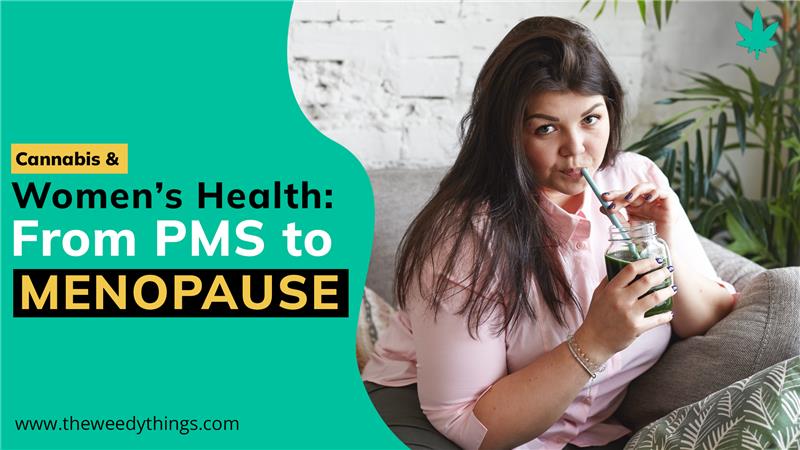For centuries, women have sought natural remedies to manage the unique challenges of their reproductive health. From the monthly discomfort of PMS to the life-stage changes of menopause, many women today are turning to cannabis as an alternative or complementary therapy. But how exactly can cannabis support women’s health, and what does the science say?
In this blog, we’ll explore the potential benefits of cannabis for women, how it works in the body, and what women should consider when using it for conditions like PMS, endometriosis, perimenopause, and menopause.
Why Cannabis? Understanding the Endocannabinoid System
Cannabis works by interacting with the endocannabinoid system (ECS) — a complex network of receptors and chemicals in our body that helps regulate mood, pain, sleep, appetite, hormones, and inflammation.
Women’s reproductive organs and hormonal pathways are rich in ECS receptors, which suggests cannabis may have a direct impact on symptoms related to the menstrual cycle and hormonal changes.
Cannabis for PMS and Menstrual Pain
Premenstrual syndrome (PMS) affects up to 75% of women, with symptoms like cramps, bloating, irritability, fatigue, and headaches. Here’s how cannabis can help:
- Pain relief: THC (tetrahydrocannabinol), the psychoactive compound in cannabis, and CBD (cannabidiol), a non-psychoactive component, both have analgesic (pain-relieving) and anti-inflammatory properties that can help ease cramps and back pain.
Mood stabilization: Many women report that cannabis helps alleviate mood swings, anxiety, and irritability associated with PMS.
Better sleep: Cannabis may improve sleep quality, which is often disrupted during menstruation.
Some women use cannabis in the form of edibles, tinctures, or even topicals like CBD creams applied to the abdomen to relieve cramps.
Cannabis and Endometriosis
Endometriosis is a painful condition where tissue similar to the uterine lining grows outside the uterus. Chronic pain, inflammation, and fertility issues are common.
Studies have shown that many women with endometriosis use cannabis to manage their pain and improve their quality of life. Cannabis may help reduce the nerve pain and inflammation associated with the disease, and improve mental health by easing depression and anxiety that often accompany chronic illness.
Cannabis Through Perimenopause and Menopause
Perimenopause (the transition into menopause) and menopause bring hormonal changes that can cause:
- Hot flashes
- Sleep disturbances
- Mood swings
- Anxiety and depression
- Vaginal dryness and low libido
Cannabis may help address many of these symptoms:
- Hot flashes & sleep: Some evidence suggests cannabis can help regulate body temperature and improve sleep, making hot flashes more manageable.
- Mood and anxiety: CBD in particular may reduce anxiety and stabilize mood swings.
- Bone health: Animal studies indicate cannabinoids might help prevent bone loss associated with menopause, though more research in humans is needed.
What to Consider Before Using Cannabis for Women’s Health
While cannabis shows promise, it’s important to approach it thoughtfully:
Talk to your doctor: Especially if you’re pregnant, breastfeeding, or taking other medications.
- Start low and go slow: Everyone reacts differently to THC and CBD. Begin with a small dose and adjust gradually.
Choose the right product: THC can be psychoactive, so if you want to avoid feeling “high,” consider CBD-rich products or low-THC strains.
- Be mindful of side effects: Dizziness, dry mouth, and fatigue are possible, and long-term effects are still being studied.
Frequently Asked Questions
Yes, cannabis, especially CBD and THC, has pain-relieving and anti-inflammatory properties that can help reduce menstrual cramps and pelvic pain during periods.
For many women, cannabis is a safe option to help manage menopause symptoms like hot flashes, mood swings, and sleep issues. However, it’s important to consult a doctor before use, especially if you have other health conditions or take medications.
Cannabis interacts with the endocannabinoid system, which is closely linked to hormone regulation. While it may help balance some symptoms of hormonal changes, more research is needed to fully understand its effects.
Many women with endometriosis use CBD to ease chronic pain and inflammation. While it doesn’t cure endometriosis, it may improve quality of life and reduce dependency on stronger pain medications.
The best method depends on the symptom you’re addressing. For localized pain, CBD topicals work well. For overall relief, tinctures, edibles, or low-THC flower may be suitable. Always start with a low dose and adjust slowly.




